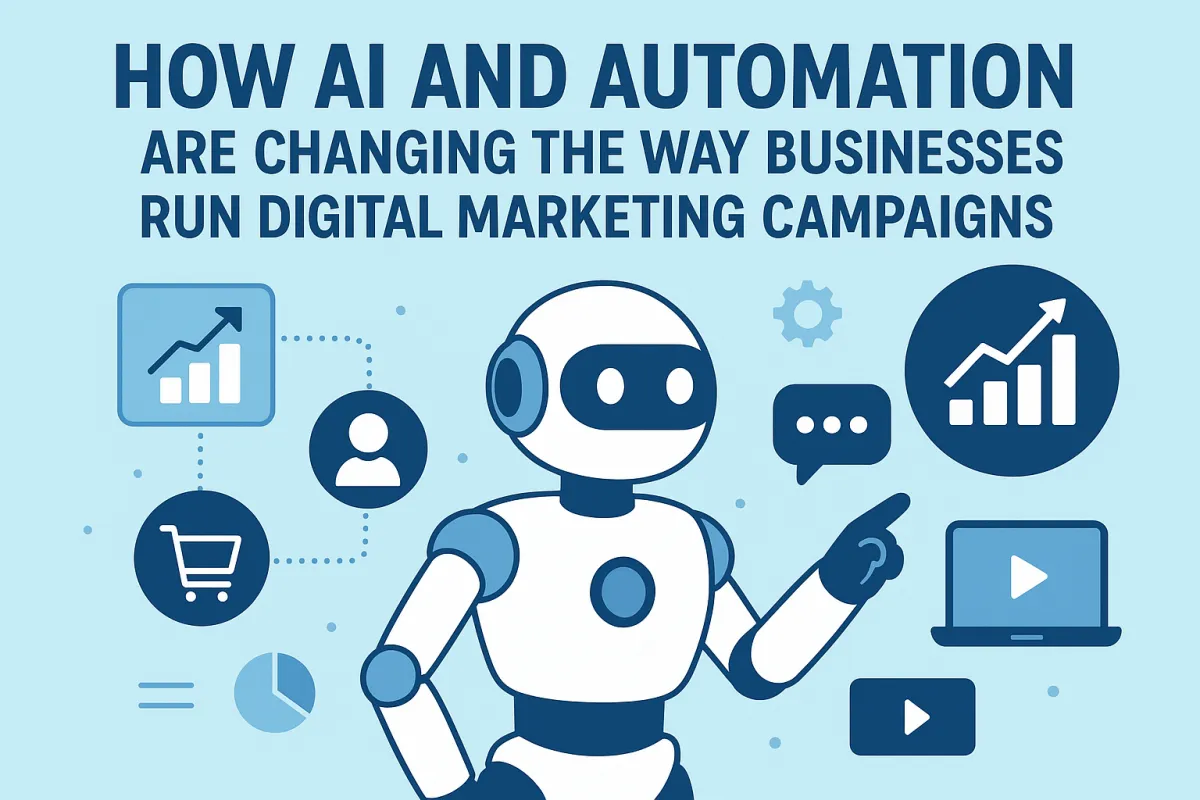
How AI and Automation Are Changing the Way Businesses Run Digital Marketing Campaigns
Digital marketing has always been about reaching the right audience at the right time with the right message. But as competition grows and consumer behavior evolves, traditional strategies are no longer enough. Today, AI (Artificial Intelligence) and automation are transforming the way businesses plan, execute, and measure their marketing campaigns.
From personalized customer experiences to predictive analytics, these technologies are helping brands work smarter, not harder. Let’s explore how AI and automation are changing digital marketing campaigns—and what it means for businesses.
1. Personalization at Scale
Consumers expect brands to understand their needs and deliver tailored content. With AI, personalization goes beyond simply using a customer’s name in an email.
AI analyzes browsing history, purchase behavior, and social interactions.
Businesses can deliver product recommendations in real time.
Automated tools ensure each customer gets relevant offers without manual effort.
For example, e-commerce sites use AI-driven recommendation engines—just like Amazon—to suggest products that align with customer preferences.
2. Smarter Audience Targeting
Traditional targeting methods rely on demographics, but AI enables behavioral and predictive targeting.
AI tools can segment audiences based on patterns in data.
Predictive analytics helps forecast future behavior, such as purchase intent.
Ads can be automatically optimized for the best-performing segments.
This ensures businesses spend less on ads while gaining higher engagement and conversions.
3. Chatbots and Conversational Marketing
Customer service is a key part of marketing. AI-powered chatbots now play a huge role in engaging customers across websites, apps, and social media.
Available 24/7, providing instant responses.
Capable of handling FAQs, product queries, and even order tracking.
Gather customer insights through conversations for future marketing strategies.
This automation reduces workload for teams while improving customer satisfaction.
4. Content Creation and Optimization
AI is no longer just about analyzing data—it can also create content.
AI tools like ChatGPT can draft blogs, captions, and ad copy.
Automation platforms suggest keywords for SEO optimization.
AI analyzes engagement to recommend the best content formats (video, blog, infographic).
While human creativity remains essential, AI accelerates content production and helps businesses stay consistent.
5. Predictive Analytics for Better Decisions
Predictive analytics uses AI to forecast trends and outcomes. For digital marketers, this means:
Identifying which campaigns will likely perform best.
Predicting customer churn and creating retention strategies.
Adjusting budgets automatically for higher ROI.
This data-driven decision-making reduces risks and maximizes results.
6. Marketing Automation for Efficiency
Automation tools streamline repetitive tasks such as:
Scheduling social media posts.
Sending drip email campaigns.
Segmenting customer lists.
Platforms like HubSpot, Mailchimp, and Hootsuite allow businesses to run campaigns seamlessly with minimal human intervention. This frees marketers to focus on strategy and creativity instead of time-consuming manual tasks.
7. Real-Time Campaign Optimization
In the past, businesses had to wait days or weeks to analyze results. Now, AI-powered platforms adjust campaigns in real time:
Ad budgets shift automatically toward better-performing ads.
Keywords are optimized instantly based on performance.
Social media engagement is tracked and adjusted on the spot.
This ensures businesses don’t waste money on ineffective campaigns.
Final Thoughts
AI and automation are no longer optional—they’re essential for businesses that want to stay competitive in digital marketing. By personalizing content, improving targeting, automating workflows, and providing real-time insights, these technologies make campaigns more effective and cost-efficient.
The future of digital marketing lies in a hybrid approach: using AI and automation for efficiency and insights while leveraging human creativity for storytelling and emotional connection. Businesses that embrace this balance will lead the way in the new digital era.